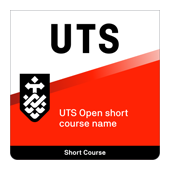Discounts are available for this course as follows:
- 10% discount for UTS staff, alumni and students
- 15% discount for group enrolment of 5 or more from the same organisation:
- To take up this offer, email law.shortcourses@uts.edu.au with
- your organisation’s name and ABN,
- the course name and date and
- the number of people in your group (minimum of 5 participants).
Discounts cannot be combined and only one discount can be applied per person per course session. Discounts can only be applied to the full price. Discounts cannot be applied to any offered special price.
How to enrol and obtain your UTS staff, alumni and student discount
Please contact the team at support@open.uts.edu.au with either your staff or student number.
If you are eligible for a UTS alumni or student discount, please ensure you have provided your UTS student number during checkout.
If you are an alumni and have forgotten your UTS student number, email support@utsopen.uts.edu.au with your full name, UTS degree and year of commencement.















